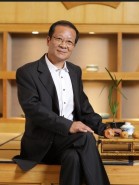Related People
Another batch2024-02-09
:11889

DONG ping Ph.D.
professor
| Doctoral supervisor
Director, Institute for Chinese Thought and Culture
- 86-571-88273350
- pingdong@zju.edu.cn
- 148 Tianmushan Road, Xixi Campus, Zhejiang University
-
- · Chinese Philosophy
- · Confucianism and Daoism in Pre-Qin Dynasty
- · Neo-Confucianism in Song-Ming Dynasties
- · Chinese Buddhist philosophies